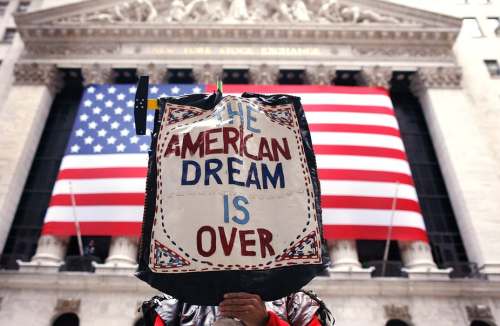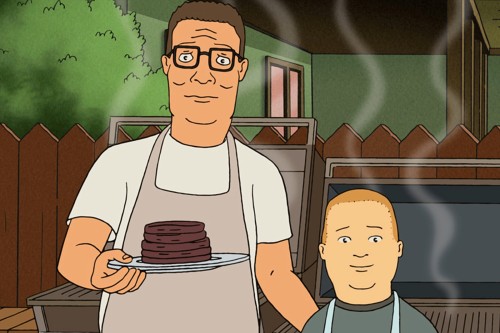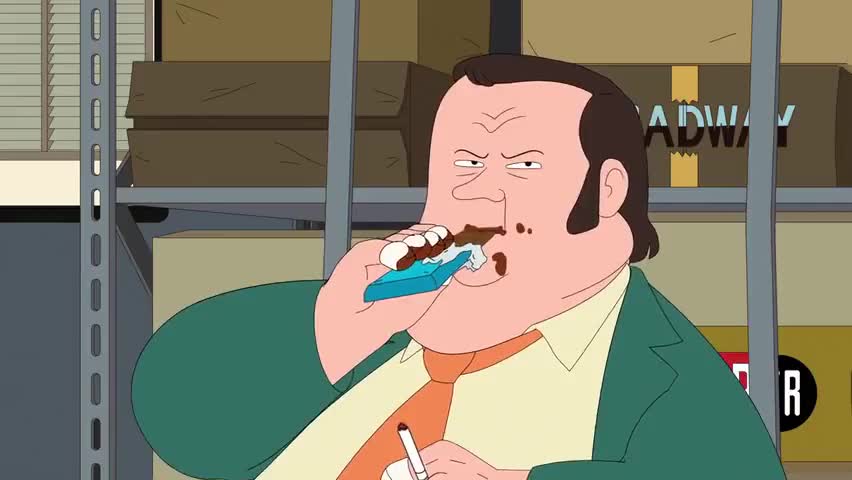
What happened to the American Dream? That’s a question more and more people are asking these days. It’s a question people have been asking in some form or another for decades. Even if you’re not American, it’s relevant because as politics and economics become more global, there’s a sense that a great many people are being left behind. More recently, it feels like that trend is accelerating.
Since I’m not a political scientist or an economist, I’m not qualified to break down all the factors behind these trends. However, given my age and relative experiences, I’ve witnessed many of the changes and upheavals that have shaped the current state of affairs. Over that period, I’ve even seen those changes reflected in two iconic animated TV shows from two disparate eras.
One is “King of the Hill,” a colorful slice of the late 90s/early 2000s cultural zeitgeist. The other is “F is for Family,” a show that, despite taking place in the 1970s, heaps plenty of scathing criticism on current American ideals. I’ve written about both shows before, citing the former as a lesson in work ethic and the latter as a perfect satire for its time. I also consider myself a fan of both shows.

On their own, they each have their own sense of style, story, and overall humor. They’re both entertaining and endearing in their own unique way. When placed side-by-side, though, they reflect an even greater message that goes beyond the themes of either shows. That message can be summed up with one harsh realization.
The American Dream isn’t just failing. Those who pursue it are being punished.
I know it sounds bleak, if not fatalistic. It’s certainly not a message that “King of the Hill” and “F is for Family” ever state overtly. However, when placed in the context of their time and their over-arching themes, the overarching themes are clear, if not unavoidable.
In terms of ideals, Hank Hill and Frank Murphy have a lot in common. They’re both hard-working American men who see themselves as embodiments of American values. They take pride in their roles and responsibilities as husbands, fathers, and providers. They’re active in shaping the identity of their community. They both have an idealized vision of what the American Dream entails.
Some of those similarities extend to their family and how they impact the structure of the show. Many plots in “King of the Hill” and “F is for Family” revolve around Hank and Frank reacting to events that happen within their family. They have wives that seek their own path and kids who rarely appreciate the work they do. Much of the comedy in each show emerges from these conflicts.

The face of many such conflicts.
Things really start to differ when the bigger picture of their respective worlds comes in. Whereas “King of the Hill” reflects a more optimistic view of the world that was more prevalent in the late 1990s, “F is for Family” paints a more dire picture. In Frank’s world, American ideals are failing and he’s struggling just to keep that vision alive.
In just three seasons, Frank has lost his job, struggled to provide for his family, and had his dreams derailed again when his wife gets pregnant. While his temper and his penchant for threatening to put people through walls don’t help, many of the factors that put him in such situations aren’t his fault. In fact, his tendency to do things the right way, as Hank often does, often work against him.

This isn’t even Frank’s worst day.
Within this dynamic, “King of the Hill” and “F is for Family” diverge in a critical way that speaks to the larger issues surrounding the American Dream. In the world of “King of the Hill,” doing the right thing and following American values are rewarded. It’s one of the show’s most common themes over the course of 13 seasons.
In this world, working hard at a blue collar job is fulfilling, respectable, and rewarding.
In this world, a man can support his family with a job that involves selling propane and propane accessories.
In this world, people who take short-cuts or try to avoid hard work ultimately fail.
In this world, a man who marries the woman he impregnates is rewarded with respect, support, and admiration.
Simply put, adhering to principles of hard work, high morals, and personal responsibility will help someone achieve the American dream. Hank Hill, with his quaint suburban house and supportive community, is the personification of these principles. It’s not always easy for him, given his influences, but that only makes his adherence to those principles more respectable.

This is virtuous system is not present in “F is for Family.” If anything, it’s turned upside down. Frank Murphy followed those principles as closely as Hank. He put his personal goals on hold when his wife got pregnant. He served his country dutifully when he got drafted. He works hard and provides, despite having a slob for a boss. However, his efforts go unrewarded. If anything, they’re punished.
In Frank Murphy’s world, a hard-working man can save the company he works for, but still get fired.
In Frank Murphy’s world, marrying your pregnant girlfriend instead of following your dreams will only get you ungrateful kids, a miserable wife, and an unfulfilling job.
In Frank Murphy’s world, people who eschew hard work and behave irresponsibility are rewarded with cocaine-fueled parties and trophy wives.
In Frank Murphy’s world, a corporation can steal your idea and make millions off it while you don’t even get credit.
The system is harsh, unfair, and completely unconcerned with who adheres to American ideals. The only thing that ever seems to matter is dumb luck and already having significant wealth or privilege. Sadly, this is a lot more consistent with the current state of affairs where the rich and powerful exact immense influence, creating a system that benefits those at the top while straining everyone else.

Frank yelling on behalf of America.
This unfair system even extends beyond the political and economic sphere. In “F is for Family,” there are multiple characters who seem to succeed, no matter how little they work or how unmotivated they are. It’s not unlike those who flaunt their lavish lifestyles on Instagram, which is often fueled by inherited wealth that they did not work for or earn.
That kind of system wouldn’t just leave Hank Hill aghast. It would completely undermine his world, his identity, and his ethics. Whether he would resort to putting people through walls instead of just kicking asses is difficult to determine, but the bigger picture is clear. The American Dream in his world is intact whereas its reversing course in “F is for Family.”
To some extent, this reversal is consistent with how the world has been trending since the late 1990s and early 2000s. People have become increasingly cynical and trust in institutions is declining. Thanks to the media and the internet, it’s getting harder to hide the harsh realities of a world where just doing the right thing isn’t enough anymore. Despite taking place before the internet, “F is for Family” perfectly reflects this reality.

The face of that harsh reality.
It creates a dynamic that’s bound to create more Frank Murphys and fewer Hank Hills. People are told that the American dream is still in their grasp. They just have to be like Hank, playing by the rules, working hard, and not taking shortcuts. Those who buy into that dream aren’t just let down. They’re outright punished.
Frank didn’t become a profanity-spewing rageaholic overnight. As perfectly depicted in the show’s opening credits, the various machinations of this unfair system just kept hitting him and no matter how hard he worked or how much he sacrificed, he never got closer to the American Dream. If anything, it just kept getting farther away.
Both “F is for Family” and “King of the Hill” have plenty to offer in terms of insights. Their respective worlds may take place in an animated world where former presidents and future serial killers can show up, but such exaggerated dynamics help each show convey a certain message that fit perfectly within the context of a certain time.

The idealism in “King of the Hill” and the satirical deconstruction in “F is for Family” paint conflicting pictures of the American Dream. Both still glorify it as an ideal, but each present a different understanding of how it plays out. Within the comedy, there are genuine, relevant messages worth considering.
For many people in the real, non-animated world, the American Dream still matters. Many still work as hard and as passionately as Hank Hill and Frank Murphy. It’s hard enough when those efforts go unrewarded, but when doing the right thing becomes a liability, it’s hard to call it a dream.











